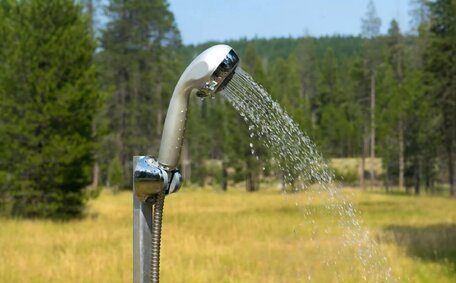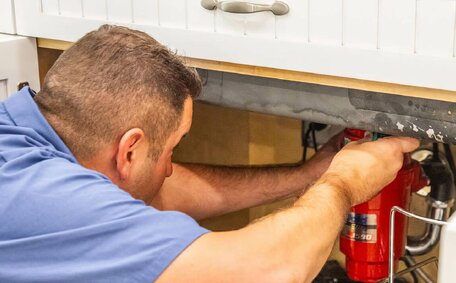Identifying the Source of the Leak in Your Hot Water System
Addressing leaks in your hot water system promptly is crucial to avoid further damage and maintain safety.
Before investigating potential leaks, ensure you turn off the power and gas to your water heater. Leaks typically happen at the top, bottom or both, often due to rust and sediment accumulation.
Inspect the area above water heater and around common points like temperature and pressure relief valve, pipes, fittings, and the drain pan. Monitor your water usage and check the meter for unexpected increases as these could signal a leak.
If you’re unable to fix the leaks, consult a licensed hot water specialist to avoid impacting the water mains and increasing your bills.
Common Locations for Leaks to Develop
Some of the most common areas for leaks to occur in a hot water system include:
- Pressure relief valve: If the valve fails or has loose fittings, water will leak out when pressure builds.
- Tank joins: The joints connecting tank components can crack over time, causing leaks.
- Heating element seals: Faulty seals around electric heating elements allow water to escape.
- Pipe connections: Loose fittings or worn washers at water line connections can lead to leaks.
Identifying leak locations can suggest underlying problems, such as corrosion near thermostats or anode rods, or rust indicated by drips at the tank’s base. The difference between drips and flowing water can indicate the severity of the leak.
Loose Pipe Fittings and Connections
A leak at pipe fittings or connections likely stems from loose hardware needing tightening. Then, inspect areas where pipes connect to your hot water tank, especially if you suspect a hot water tank leaking, along with checking the pressure relief valve, heating element, shut off valve and supply lines. Give threaded connections a gentle tighten with a pipe wrench - take care not to overtighten. If drips persist despite tightened hardware, you probably need to replace corroded parts to address the leak.
To start repairs, turn off the gas and power, then tighten compression fittings and replace any worn washers to prevent leaks. Don’t hesitate to call professional help when addressing complicated water system issues.
Faulty Pressure Relief Valves
Pressure relief valves, crucial for the safety of your hot water heater, are designed to release high water pressure from the tank. A faulty relief valve that does not open when prompted can lead to your system succumbing to too much internal pressure, causing leaks. Alternatively, valves that fail to fully close or have loose fittings can result in a hot water leak, even without high tank pressure.
Start by visually inspecting your relief valve and associated pipes for drips, rust or corrosion. Continuous dripping indicates a potential fault in the TP valve and may necessitate replacement. Look for signs of leaks like rust or corrosion on your relief valve and connecting pipes.
Lift the tap lever gently to test the valve; expect some dripping, which should stop once the lever is returned to its original position.
If the valve appears functional but leaks persist, examine areas such as the anode rod, thermostat, or possible tank fractures. For hidden leaks, seek professional detection services to determine whether repairs or more extensive work is required.
Cracks or Corrosion in the Water Tank
Cracks or corrosion in the tank’s inner lining can lead to leaks, often indicated by rusty water or drips at the tank’s base.
Tapping on the tank exterior can help identify potential weak, corroded spots based on a hollow sound.
Water and mineral buildup can significantly corrode steel tanks, often causing leaks. Inspect tanks over 10 years old for cracks and direct leaks. The location and severity can indicate whether simple patching is worthwhile or if a leak allowance for a complete tank replacement is needed.
For isolated pinhole leaks or minor cracks in the storage tank, epoxy-based sealants can provide a temporary fix while determining if your water system should be permanently repaired.
Severe corrosion damage typically necessitates replacement, with enamel-lined stainless steel tanks offering better resistance to corrosion. But extensive corrosion damage cannot be reliably repaired, making replacement the prudent option.
Signs You Have a Serious Issue Needing Professional Help
There are several signs indicating your hot water system has a serious underlying issue requiring professional assistance:
- Persistent, worsening leaks at locations such as pipe connections, valves, or tank joints, despite attempts at repairs.
- Rumbling or banging noises from the tank and pipes could signal issues requiring professional attention.
- Heavily discoloured water with particulates coming out of taps.
- Inability to control water temperature - scalding hot water exiting taps.
- Complete absence of any hot water supply not linked to an obvious reason.
- Significant drops in water pressure.
- A tilted or moved tank position.
Whereas tightening fittings can remedy small leaks, complex system issues typically require a licensed plumber. Continued use amidst unresolved issues could escalate into water damage to your property or pose safety risks such as electric shocks, burns or contamination.
Upon noticing any warning signs, immediately shut off the water and power to your hot water system. Contact Penrith Plumbing to identify and fix the issue before restoring the water supply. Catching problems early also allows for repair or tank replacement if needed rather than overhauling your unit entirely.
When to Call a Licensed Plumber
Calling a professional plumber is advised when you encounter issues beyond a basic DIY fix, enabling you to find out more about your hot water system leaks. Licenced experts have the skills and equipment to safely address problems like:
- Gas line leaks - attempts to repair gas pipes or fittings without proper certification risk fires or explosions.
- Electrical faults in electric hot water systems - incorrect handling of live wiring poses electrocution dangers.
- Tank replacement - installing new tanks requires modifying pipework and connections.
- Total hot water failure without identifiable cause - diagnosing complex system faults requires technical expertise.
Penrith Plumbing is fully licensed and ready to address complex hot water system issues.
We service the greater Penrith region and provide comprehensive support for water heaters, including thorough inspections for leaks or repairs to address persistent leaks, supply issues, abnormal noises from pipes or tanks, and other water heating system problems.
Replacing vs Repairing Your Hot Water System
When faced with leaks or other persistent issues in an ageing hot water system, a common dilemma is deciding between repairing or replacing the entire unit. Key factors to weigh up include the potential for a new water heating solution:
- Consider age: Systems over 10 years old may be less cost-effective to repair than replace with a new hot water system. Newer models last 15+ years.
- Efficiency: Transitioning to setups like solar hot water units or instant hot water systems can yield considerable energy bill reductions over time.
- Recurring problems: Repetitive faults indicate systemic decline signal a replacement is the prudent choice.
- Cost: Compare repair expenses over time versus a one-off replacement investment.
The aim is to maintain a safe and dependable hot water supply cost-effectively, with upgrades potentially offering long-term savings. Frequently, opting for replacement is the more sensible decision.
The expert team at Penrith Plumbing, a plumbing service provider, can inspect your system and provide advice tailored to your specific situation. We determine whether targeted repairs or full unit replacement is the best path forward to meet your household’s needs. For an obligation-free assessment, call us at 1300 349 338 or email jobs@penrithplumbingservices.com.au.
Regular Maintenance to Prevent Leaks
Regular maintenance is key to preventing leaks and extending the life of your hot water system. We recommend the following preventative measures every 6-12 months:
- Visually inspect the tank, pipes, and fittings for drips, rust, or cracks, and secure any loose components.
- Evaluate the pressure your system is under for any indications of cold water intrusions that could affect your ideal hot water temperature – aim for 50-60°C and less than 600 kPa respectively. Adjust the thermostat if required.
- What can I do to maintain my system? Drain and flush the tank to remove sediment buildup. This can be done through the drain valve.
- Replace worn parts like relief valve seals and anode rods as a protective measure.
- Have a licenced plumber conduct a thorough system inspection and tune-up to catch any issues.
Investing in scheduled professional maintenance checks can help prevent many major system failures down the track. Call Penrith Plumbing at 1300 349 338 for details on home-specific maintenance plans.
Inspecting Your System
As part of routine hot water system maintenance, homeowners should periodically inspect their units even when no leaks are apparent. This allows early detection of minor problems before they worsen.
For safety, shut off both power and gas before inspection.
Visually inspect all fittings and connections for any drips that may indicate looseness. Tapping the tank can help identify hidden weak points prone to corrosion based on a hollow sound.
Also examine components like pressure relief valves and anode rods for trapped debris or significant wearing. Test valves by gently easing the lever - the valve should not release water once lowered again. Replace worn washers, seals, and internal components to guard against potential leaks in your hot water system.
During inspection, verify that water pressure is maintained at about 500 kPa and the temperature is kept at 60°C. Adjust thermostats or valves accordingly if the readings are too high. If you notice abnormal pressure, overheating or strange noises, contact Penrith Plumbing for diagnostic assistance.
Flushing the Tank
Flushing out sediment buildup within your hot water system’s tank is essential maintenance to ensure efficiency and prevent corrosion issues over time. Follow these steps to safely flush your tank:
- Ensure the power to the hot water unit is turned off before starting maintenance, as a safety precaution.
- Attach a garden hose to the tank’s drain valve near the bottom to handle any water discharge. Lead the hose outdoors.
- Gradually open the drain valve to allow water and sediment to flow out, continue this for 5-10 minutes until the water becomes clear.
- Close drain valve once flushed. Turn water and power back on, and check for leaks.
Should you feel uneasy about managing power elements during tank flushing, seek professional assistance. The expert team at Penrith Plumbing can flush your system thoroughly during standard maintenance. Contact us on 1300 349 338 to ask about maintenance plans for your home.






